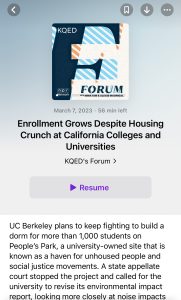39 Choosing Credible Sources
Gina Kessler Lee
Learning Objectives
By the end of this chapter, you should be able to
- Name some indicators of credibility
- Explain how different sources might contain different types of credibility that can inform your understanding of an issue in different ways
When you’re trying to decide whether a source is credible, you might start by looking at a few key indicators:
- Who: the author’s expertise
- Where it was published: the publication’s reputation and editorial process
- When: the date of publication
- Why: the author’s purpose and point of view
This video explains further:
Video 39.1. Evaluating sources for credibility by libncsu
Where would you look for indicators of credibility on this article?
There are no “good” and “bad” sources
However, as you’re judging credibility, keep in mind that there aren’t “good” sources and “bad” sources. It depends what you’re using your source for.

It’s rare to find a completely unbiased source. Our understanding of the facts on a topic changes over time, and any source is going to have to pick and choose which facts and ideas to bring in and which ones to leave out. Even academic articles are written by humans who bring their own biases to their research, try as they might to mitigate them. Plus, you might want to bring in sources that lean toward one side or another on your topic, to show the range of arguments on the subject. This allows you to jump in with the points that you think are compelling—or lacking—from those pieces. The important thing is to make sure you can recognize and acknowledge your sources’ viewpoints or biases when you introduce and comment on your sources in your writing.
For example, if you’re writing an essay about QAnon conspiracy theories, you might need to quote some QAnon posts from online message boards. While these are just conspiracy theories, and you wouldn’t want to take them as truth, they could be the perfect primary sources for an essay in which you analyze the language of these posts and their connections to tropes from past conspiracy theories. You would make it clear to your reader the context of these posts and that you were examining these posts as artifacts, but you wouldn’t present them as truthful statements. However, you wouldn’t want to use conspiracy-theory message board posts as factual sources supporting an actual conspiracy theory in an academic research paper.

Incorporating multiple types of authority
Here’s a real example from a radio show and podcast. When the call-in show Forum on public radio station KQED hosted an episode about the lack of campus housing for California college students, they brought on four different sources to shed light on this issue:
- Su Jin Jez, CEO, California Competes – a nonpartisan policy and research organization focused on the intersection of higher education, equity, and the economy.
- Bill Fulton, urban planner, William Fulton Group; author, “Place and Prosperity: How Cities Help Us to Connect and Innovate”
- Ryan Loyola, student, UC Santa Cruz
- Katie Lauer, Berkeley news reporter, The Mercury News
As you can see, there wasn’t just one type of expertise they found valuable. Instead, they brought on a researcher at a nonprofit, an urban planner, a journalist, and a college student who could speak to his and his classmates’ experiences looking for and trying to afford housing. Each of these people brought a different viewpoint on this complex issue to the discussion. Similarly, your writing can bring in different kinds of expertise too.*
*Note: Some college assignments will require you to only use one kind of expertise—for example, a psychology course might require you to synthesize three related empirical, peer-reviewed journal articles by academic psychologists.
Writing Our Bodies
Consider: how might each of the guests on the KQED Forum radio show have brought a different embodied experience to the same topic of not having enough housing for California college students?
Write to Learn: Consider Different Kinds of Credibility on Your Topic
Media Attributions
- Virginia_2nd_Amendment_Rally_(2020_Jan)_-_49416341132 © Anthony Crider is licensed under a CC BY (Attribution) license
- KQED Forum Enrollment Grows Despite Housing Crunch adapted by Gina Lee is licensed under a CC0 (Creative Commons Zero) license
